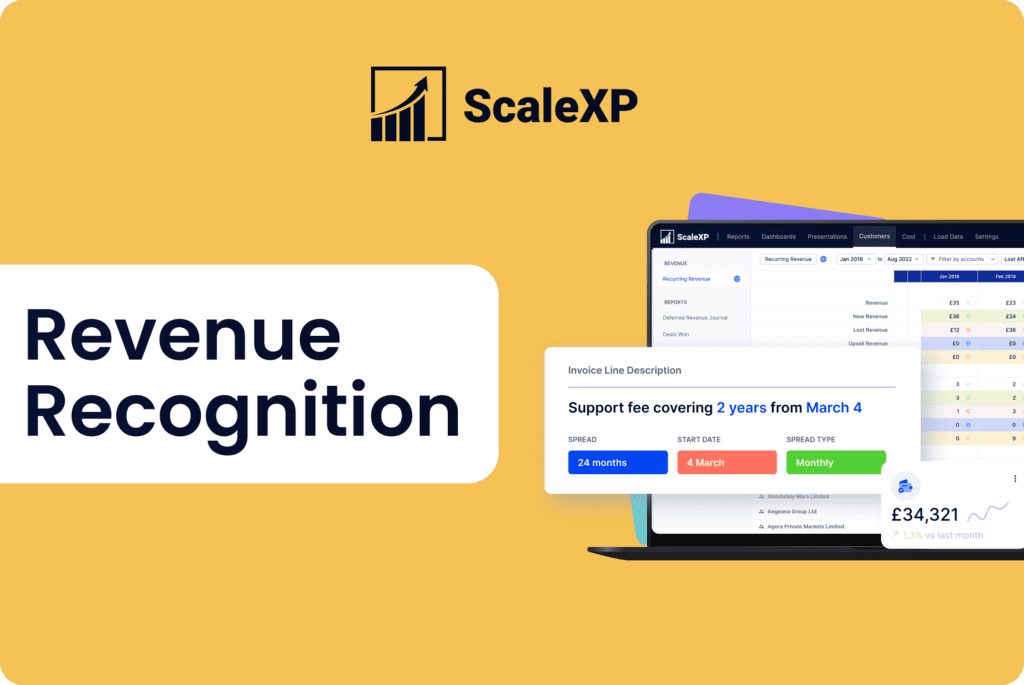Accurate revenue recognition is essential for giving investors, lenders, and anyone interested in your company a clear, honest picture of your financial health. It shows exactly how your business generates income, making decision-making much easier for everyone involved.
Introduction
Your ability to accurately recognise revenue is more than just a financial imperative – it’s a strategic necessity. Accurate revenue recognition makes sure your financial statements accurately reflect your business’ performance, which can help to build trust with key stakeholders across your business, and externally.
For your SaaS company, understanding and implementing effective revenue recognition practices is vital for sustainable growth and success. We’ll cover the importance of accurate revenue recognition in SaaS below, so you can understand its significance and how it impacts your business decisions.
The complexities of revenue recognition in SaaS
Your SaaS business model, characterised by its subscription-based revenue streams, presents unique challenges in revenue recognition.
Unlike traditional sales models where revenue is recognised at the point of sale, SaaS models involve ongoing customer engagements with recurring billing cycles. This complexity is further compounded when considering customer additions, upgrades, downgrades, and cancellations, each altering the revenue recognition landscape.
Here are just some of the challenges you may face when it comes to revenue recognition in SaaS:
- Disparity between cash and accrued revenue: Most SaaS companies encounter significant discrepancies between the invoiced revenue and the amount earned, due to the subscription nature of their services.
- Varying subscription lengths: Your SaaS company may deal with varying subscription terms, ranging from monthly to annual commitments. This variability requires a robust system to accurately track and recognise revenue over the subscription period.
- Multi-dimensional tracking: For robust documentation and audit trail, you need to track both reported revenue and recurring revenue by customer, invoice, and contract. You’ll want to understand revenue by customer and why it changes month on month. This involves keeping track of large amounts of complex data streams and regularly updating them.
Why accurate revenue recognition matters in SaaS
Reflecting true financial performance
Accurate revenue recognition is vital in reflecting the true financial performance of your SaaS business. It ensures that revenue is reported in the correct accounting period, providing an authentic picture of your company’s financial health.
Influencing strategic decisions
Revenue figures are a key factor in strategic decision-making. Inaccuracies can lead to misguided strategies, such as unwarranted expansions or ill-advised cutbacks, potentially derailing your company’s growth.
Impacting valuations and funding
For SaaS companies, especially startups seeking funding, valuation largely hinges on revenue projections. Inaccurate revenue recognition can lead to inflated valuations, affecting future funding rounds and investor relations.
Ensuring legal and regulatory compliance
Compliance with accounting standards and legal regulations is non-negotiable. Inaccurate revenue recognition can result in legal penalties, fines, and a loss of credibility in your industry.
Repercussions of inaccurate revenue recognition
Financial restatements
If revenue is not recognised accurately, it may necessitate financial restatements. This can erode investor trust and can have a significant impact on your company’s stock price and market reputation.
Legal and regulatory sanctions
Inaccurate reporting can attract legal and regulatory sanctions, including penalties from bodies such as the Financial Reporting Council (FRC) in the UK or the Securities and Exchange Commission (SEC) in the US.
Damage to credibility and investor relations
The trust of investors and stakeholders is paramount. Any misstep in financial reporting can severely damage relationships with investors, affecting future investment opportunities.
Operational disruptions
Inaccuracies in revenue recognition can lead to operational disruptions. For instance, misjudged revenue figures might lead to inadequate resource allocation or misinformed budgeting decisions.
The role of revenue recognition in business strategy
Accurate revenue recognition is not just about compliance and financial reporting. It plays a crucial role in your strategic decision-making too. Here are just some benefits of revenue recognition within business strategy:
- Budgeting and forecasting: Accurate financial data is the foundation of effective budgeting and forecasting. It enables SaaS companies to allocate resources optimally and plan for future growth.
- Investor relations: In a sector where investor confidence is paramount, transparent and accurate revenue reporting is essential. It reassures investors of the company’s financial health and compliance with accounting standards.
- Performance metrics: Key performance indicators (KPIs), such as Monthly Recurring Revenue (MRR) and Annual Recurring Revenue (ARR), rely heavily on accurate revenue recognition. These metrics guide strategic decisions and operational adjustments.
Compliance with accounting standards
For SaaS companies, adhering to accounting standards like the International Financial Reporting Standards (IFRS 15) and the Accounting Standards Codification (ASC 606) is vital.
These standards provide a framework for recognising revenue from contracts with customers and are critical for maintaining financial integrity and transparency.
- IFRS 15: This standard outlines a five-step model to recognise revenue, focusing on contract terms and customer obligations.
- ASC 606: Similar to IFRS 15, ASC 606 provides guidelines for revenue recognition, particularly focusing on when and how revenue is recognised in customer contracts.
Leveraging technology for accurate revenue recognition
In addressing these challenges, technology plays a pivotal role. Advanced software solutions like ScaleXP offer SaaS companies the tools to track, manage, and report revenue with precision. These solutions automate the processes involved in revenue recognition, ensuring accuracy and compliance.
- Automated revenue tracking: Software solutions automate the tracking of subscription changes, cancellations, and renewals, providing real-time revenue data.
- Compliance assurance: These tools are designed to align with accounting standards, ensuring that revenue recognition practices meet regulatory requirements.
- Insightful reporting: With comprehensive reporting capabilities, you can gain deeper insights into your financial performance, aiding your strategic decision-making.
Conclusion
For SaaS businesses, the significance of accurate revenue recognition cannot be overstated. It’s a critical component that influences financial stability, investor confidence, and strategic decision-making.
By embracing the right practices and tools like those provided on the ScaleXP platform, SaaS companies can navigate this complex landscape with confidence and precision.
Why not book a free demo today and see how we can help with your revenue recognition?






